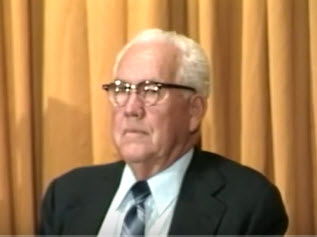Related Research Articles
The American Statistical Association (ASA) is the main professional organization for statisticians and related professionals in the United States. It was founded in Boston, Massachusetts on November 27, 1839, and is the second-oldest continuously operating professional society in the U.S. behind the Massachusetts Medical Society. ASA services statisticians, quantitative scientists, and users of statistics across many academic areas and applications. The association publishes a variety of journals and sponsors several international conferences every year.
In statistics, imputation is the process of replacing missing data with substituted values. When substituting for a data point, it is known as "unit imputation"; when substituting for a component of a data point, it is known as "item imputation". There are three main problems that missing data causes: missing data can introduce a substantial amount of bias, make the handling and analysis of the data more arduous, and create reductions in efficiency. Because missing data can create problems for analyzing data, imputation is seen as a way to avoid pitfalls involved with listwise deletion of cases that have missing values. That is to say, when one or more values are missing for a case, most statistical packages default to discarding any case that has a missing value, which may introduce bias or affect the representativeness of the results. Imputation preserves all cases by replacing missing data with an estimated value based on other available information. Once all missing values have been imputed, the data set can then be analysed using standard techniques for complete data. There have been many theories embraced by scientists to account for missing data but the majority of them introduce bias. A few of the well known attempts to deal with missing data include: hot deck and cold deck imputation; listwise and pairwise deletion; mean imputation; non-negative matrix factorization; regression imputation; last observation carried forward; stochastic imputation; and multiple imputation.

Bradley Efron is an American statistician. Efron has been president of the American Statistical Association (2004) and of the Institute of Mathematical Statistics (1987–1988). He is a past editor of the Journal of the American Statistical Association, and he is the founding editor of the Annals of Applied Statistics. Efron is also the recipient of many awards.
In statistics, a generalized estimating equation (GEE) is used to estimate the parameters of a generalized linear model with a possible unmeasured correlation between observations from different timepoints. Although some believe that GEEs are robust in everything, even with the wrong choice of working correlation matrix, generalized estimating equations are robust only to loss of consistency with the wrong choice.

Michael Louis Friendly is an American-Canadian psychologist, Professor of Psychology at York University in Ontario, Canada, and director of its Statistical Consulting Service, especially known for his contributions to graphical methods for categorical and multivariate data, and on the history of data and information visualisation.
John Neter was a German-born American statistician, University professor, and widely published author.

Morris Howard Hansen (1910–1990) was an American statistician. While at the United States Census Bureau, he was one of the first to develop methods for statistical sampling and made contributions in many areas of surveys and censuses.
Jun S. Liu is a Chinese-American statistician focusing on Bayesian statistical inference, statistical machine learning, and computational biology. He was assistant professor of statistics at Harvard University from 1991 to 1994. From 1994 to 2004, he was Assistant, Associate, and full Professor of Statistics at Stanford University. Since 2000, Liu has been Professor of Statistics in the Department of Statistics at Harvard University and held a courtesy appointment at Harvard T.H. Chan School of Public Health.
Marie Davidian is an American biostatistician known for her work in longitudinal data analysis and precision medicine. She is the J. Stuart Hunter Distinguished Professor of Statistics at North Carolina State University. She was president of the American Statistical Association for 2013.
Jennifer Ann Hoeting is an American statistician known for her work with Adrian Raftery, David Madigan, and others on Bayesian model averaging. She is a professor of statistics at Colorado State University, and executive editor of the open-access journal Advances in Statistical Climatology, Meteorology and Oceanography, published by Copernicus Publications. With Geof H. Givens, a colleague at Colorado State, she is the author of Computational Statistics, a graduate textbook on computational methods in statistics.
Benjamin Strong Baumer is a statistician and sabermetrician. He is a professor of statistical and data sciences at Smith College, and was formerly the statistical analyst for the New York Mets.
Paul D. Allison is an American statistician and sociologist. He is the President of Statistical Horizons and Professor Emeritus of Sociology at the University of Pennsylvania.
Sharon Xiangwen Xie is a Chinese biostatistician and epidemiologist who studies neurodegenerative diseases. She is a professor of biostatistics in the Department of Biostatistics, Epidemiology, and Informatics at the University of Pennsylvania.
J. Lynn Palmer is an American biostatistician known for her research on missing data and on treatment of cancer.
Ann C. Russey Cannon is an American statistics educator, the Watson M. Davis Professor of Mathematics and Statistics at Cornell College in Iowa. As of 2016, she was the only statistician at Cornell College.
Katherine Jenny Thompson is a statistician in the United States Census Bureau, where she is Methodology Director of Complex Survey Methods and Analysis Group in the Economic Statistical Methods Division.
Beth L. Chance is an American statistics educator. She is a professor of statistics at the California Polytechnic State University.

Roderick Joseph Alexander Little is an academic statistician, whose main research contributions lie in the statistical analysis of data with missing values and the analysis of complex sample survey data. Little is Richard D. Remington Distinguished University Professor of Biostatistics in the Department of Biostatistics at the University of Michigan, where he also holds academic appointments in the Department of Statistics and the Institute for Social Research.
John Bailer is an American statistician. He is University Distinguished Professor of Statistics at Miami University in Ohio, USA. He is also affiliated with the Departments of Media, Journalism and Film, Biology and Sociology and Gerontology at Miami. His work focuses on risk assessment in occupational health, and combining journalism to statistics. He created the podcast Stats+Stories, which “Addresses The Story Behind The Statistics And The Statistics Behind The Stories.” It is sponsored by the American Statistical Association and is hosted on National Public Radio podcasts and other podcast locations. In 2021, Bailer and his podcast colleagues received the JBPM Communications Award.
Thomas Lumley is an Australian statistician who serves as the chair of biostatistics at the University of Auckland in New Zealand. Lumley is also a member of the "R Core Team."
References
- 1 2 3 "Horton, Nicholas J. | Faculty & Staff | Amherst College". www.amherst.edu. Retrieved 2021-04-05.
- ↑ "Alumnus Nick Horton Elected ASA Vice President" . Retrieved October 13, 2023.
- ↑ Kleinman, Ken (2014). SAS and R: data management, statistical analysis, and graphics. Nicholas J. Horton (2nd ed.). Boca Raton. ISBN 978-1-4665-8450-1. OCLC 881692641.
{{cite book}}: CS1 maint: location missing publisher (link) - ↑ "Guidelines for Assessment and Instruction in Statistics Education Reports". www.amstat.org. Retrieved 2021-05-17.
- ↑ Baumer, Benjamin S. (2021). Modern data science with R. Daniel T. Kaplan, Nicholas J. Horton (2nd ed.). Boca Raton. ISBN 978-0-367-19149-8. OCLC 1245354400.
{{cite book}}: CS1 maint: location missing publisher (link) - ↑ Goldstein, Jill M.; Seidman, Larry J.; Horton, Nicholas J.; Makris, Nikos; Kennedy, David N.; Caviness, Verne S. Jr; Faraone, Stephen V.; Tsuang, Ming T. (2001-06-01). "Normal Sexual Dimorphism of the Adult Human Brain Assessed by In Vivo Magnetic Resonance Imaging". Cerebral Cortex. 11 (6): 490–497. doi: 10.1093/cercor/11.6.490 . ISSN 1047-3211. PMID 11375910.
- ↑ Horton, Nicholas J.; Kleinman, Ken P. (2007-02-01). "Much ado about nothing: A comparison of missing data methods and software to fit incomplete data regression models". The American Statistician. 61 (1): 79–90. doi:10.1198/000313007X172556. ISSN 0003-1305. PMC 1839993 . PMID 17401454.
- ↑ "Meet the ASA's 2022 Incoming Editors | Amstat News". 2022-02-01. Retrieved 2022-03-06.
- ↑ "American Statistical Association Names 48 Fellows for 2012". PRWeb. Archived from the original on June 30, 2018. Retrieved 2021-04-05.
- ↑ "2017 AAAS Fellows Recognized for Advancing Science | American Association for the Advancement of Science". www.aaas.org. Retrieved 2021-04-05.
- ↑ Dunau, Bera (2019-08-31). "A new dawn for rail? Valley Flyer pilot makes its debut". Amherst Bulletin .
- ↑ Kohout, George (2016-01-06). "George Kohout: Recognizing two unsung heroes of Northampton trails, greenways". Daily Hampshire Gazette .